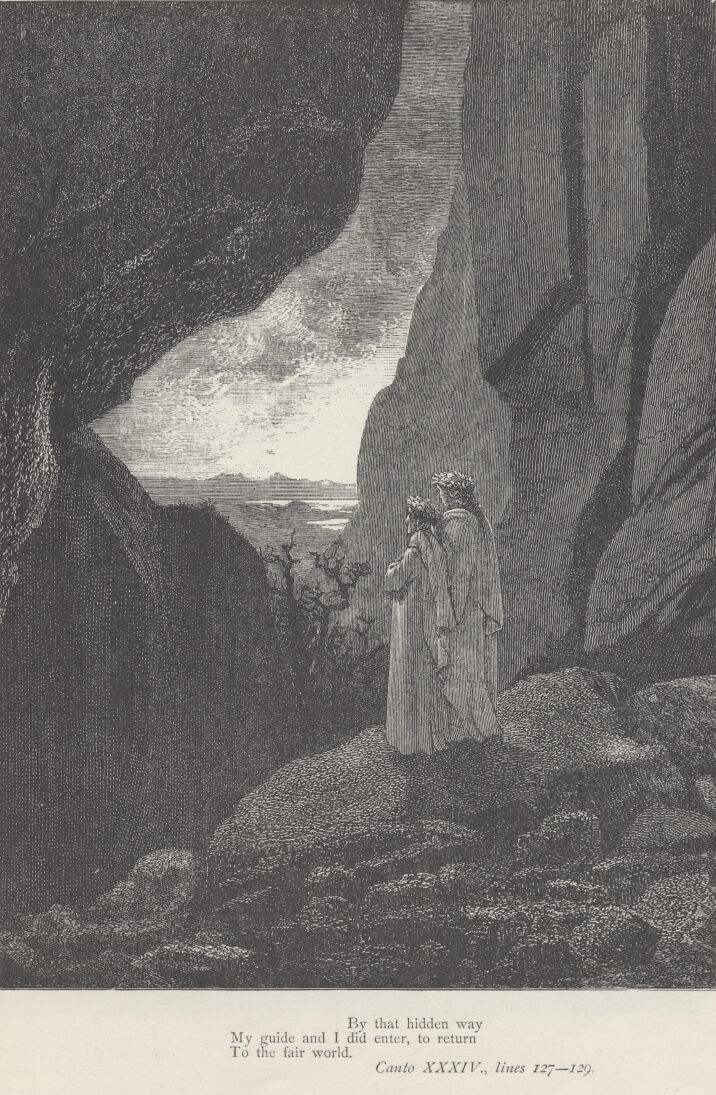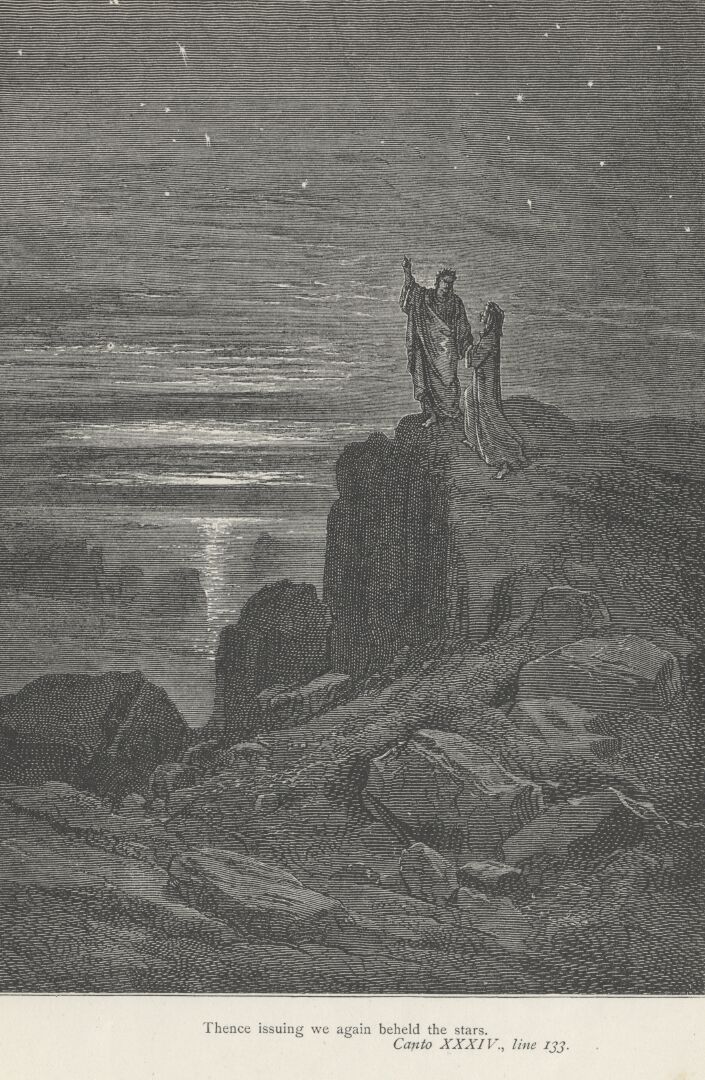
Inferno: Canto XXXIV
Enjoy the full responsive display in a wider browser
"'Vexilla Regis prodeunt Inferni'
Towards us; therefore look in front of thee,"
My Master said, "if thou discernest him."
As, when there breathes a heavy fog, or when
Our hemisphere is darkening into night,
Appears far off a mill the wind is turning,
Methought that such a building then I saw;
And, for the wind, I drew myself behind
My Guide, because there was no other shelter.
Now was I, and with fear in verse I put it,
There where the shades were wholly covered up,
And glimmered through like unto straws in glass.
Some prone are lying, others stand erect,
This with the head, and that one with the soles;
Another, bow-like, face to feet inverts.
When in advance so far we had proceeded,
That it my Master pleased to show to me
The creature who once had the beauteous semblance,
He from before me moved and made me stop,
Saying: "Behold Dis, and behold the place
Where thou with fortitude must arm thyself."
How frozen I became and powerless then,
Ask it not, Reader, for I write it not,
Because all language would be insufficient.
I did not die, and I alive remained not;
Think for thyself now, hast thou aught of wit,
What I became, being of both deprived.
The Emperor of the kingdom dolorous
From his mid-breast forth issued from the ice;
And better with a giant I compare
Than do the giants with those arms of his;
Consider now how great must be that whole,
Which unto such a part conforms itself.
Were he as fair once, as he now is foul,
And lifted up his brow against his Maker,
Well may proceed from him all tribulation.
O, what a marvel it appeared to me,
When I beheld three faces on his head!
The one in front, and that vermilion was;
Two were the others, that were joined with this
Above the middle part of either shoulder,
And they were joined together at the crest;
And the right-hand one seemed 'twixt white and yellow;
The left was such to look upon as those
Who come from where the Nile falls valley-ward.
Underneath each came forth two mighty wings,
Such as befitting were so great a bird;
Sails of the sea I never saw so large.
No feathers had they, but as of a bat
Their fashion was; and he was waving them,
So that three winds proceeded forth therefrom.
Thereby Cocytus wholly was congealed.
With six eyes did he weep, and down three chins
Trickled the tear-drops and the bloody drivel.
At every mouth he with his teeth was crunching
A sinner, in the manner of a brake,
So that he three of them tormented thus.
To him in front the biting was as naught
Unto the clawing, for sometimes the spine
Utterly stripped of all the skin remained.
"That soul up there which has the greatest pain,"
The Master said, "is Judas Iscariot;
With head inside, he plies his legs without.
Of the two others, who head downward are,
The one who hangs from the black jowl is Brutus;
See how he writhes himself, and speaks no word.
And the other, who so stalwart seems, is Cassius.
But night is reascending, and 'tis time
That we depart, for we have seen the whole."
As seemed him good, I clasped him round the neck,
And he the vantage seized of time and place,
And when the wings were opened wide apart,
He laid fast hold upon the shaggy sides;
From fell to fell descended downward then
Between the thick hair and the frozen crust.

When we were come to where the thigh revolves
Exactly on the thickness of the haunch,
The Guide, with labour and with hard-drawn breath,
Turned round his head where he had had his legs,
And grappled to the hair, as one who mounts,
So that to Hell I thought we were returning.
"Keep fast thy hold, for by such stairs as these,"
The Master said, panting as one fatigued,
"Must we perforce depart from so much evil."
Then through the opening of a rock he issued,
And down upon the margin seated me;
Then tow'rds me he outstretched his wary step.
I lifted up mine eyes and thought to see
Lucifer in the same way I had left him;
And I beheld him upward hold his legs.
And if I then became disquieted,
Let stolid people think who do not see
What the point is beyond which I had passed.
"Rise up," the Master said, "upon thy feet;
The way is long, and difficult the road,
And now the sun to middle-tierce returns."
It was not any palace corridor
There where we were, but dungeon natural,
With floor uneven and unease of light.
"Ere from the abyss I tear myself away,
My Master," said I when I had arisen,
"To draw me from an error speak a little;
Where is the ice? and how is this one fixed
Thus upside down? and how in such short time
From eve to morn has the sun made his transit?"
And he to me: "Thou still imaginest
Thou art beyond the centre, where I grasped
The hair of the fell worm, who mines the world.

That side thou wast, so long as I descended;
When round I turned me, thou didst pass the point
To which things heavy draw from every side,
And now beneath the hemisphere art come
Opposite that which overhangs the vast
Dry-land, and 'neath whose cope was put to death
The Man who without sin was born and lived.
Thou hast thy feet upon the little sphere
Which makes the other face of the Judecca.
Here it is morn when it is evening there;
And he who with his hair a stairway made us
Still fixed remaineth as he was before.
Upon this side he fell down out of heaven;
And all the land, that whilom here emerged,
For fear of him made of the sea a veil,
And came to our hemisphere; and peradventure
To flee from him, what on this side appears
Left the place vacant here, and back recoiled."
A place there is below, from Beelzebub
As far receding as the tomb extends,
Which not by sight is known, but by the sound
Of a small rivulet, that there descendeth
Through chasm within the stone, which it has gnawed
With course that winds about and slightly falls.
The Guide and I into that hidden road
Now entered, to return to the bright world;
And without care of having any rest
We mounted up, he first and I the second,
Till I beheld through a round aperture
Some of the beauteous things that Heaven doth bear;
Thence we came forth to rebehold the stars.
- Prev
- Canto XXXIV